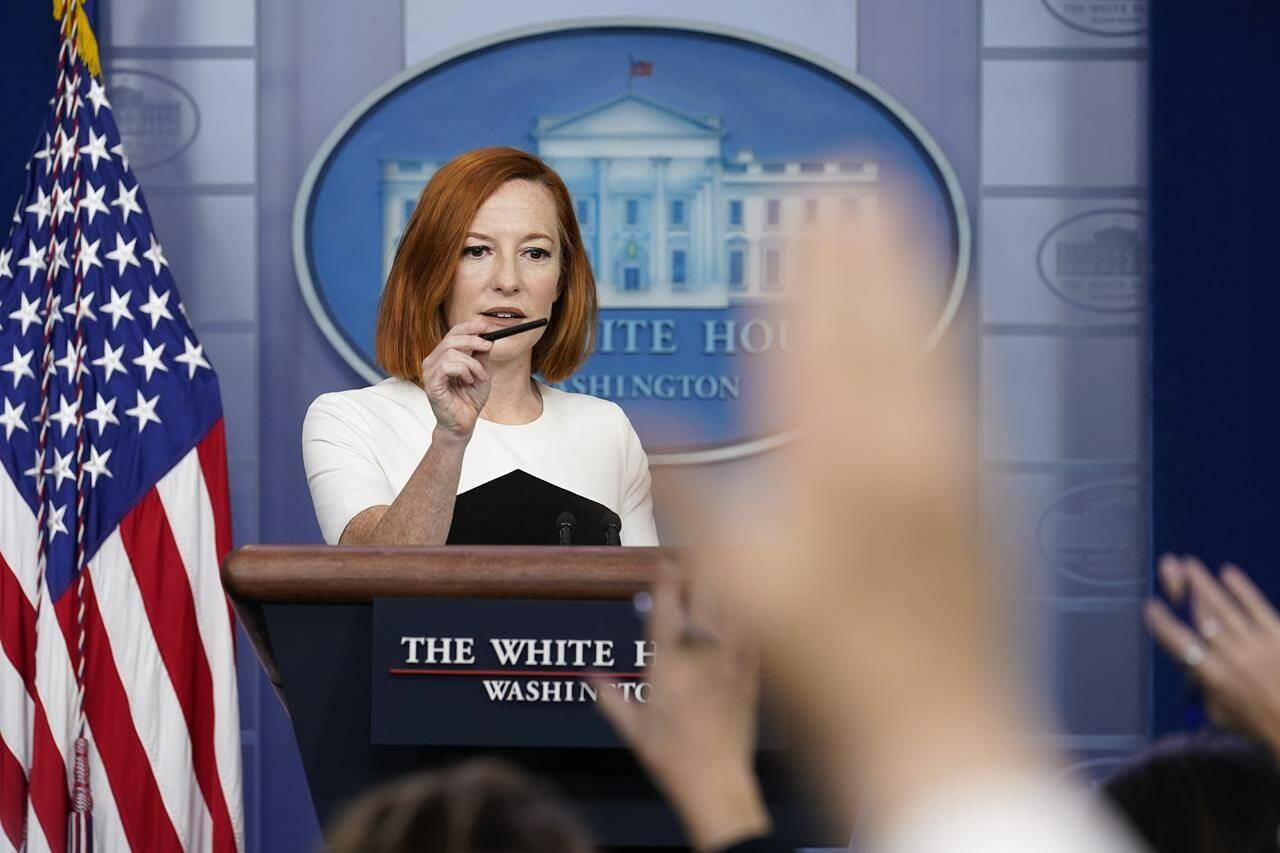The United States confirmed Monday it won’t be sending any diplomatic officials to the Winter Olympics in Beijing next year — and suggested strongly that it would welcome similar displays of international solidarity from countries around the world.
The White House has been hinting for weeks at plans to send a strong message about China’s “egregious” record on human rights, particularly its treatment of Uyghurs in the Xinjiang region, without denying its athletes the chance to compete.
“Standing up for human rights is in the DNA of Americans,” press secretary Jen Psaki told the daily briefing.
“We have a fundamental commitment to promoting human rights and we feel strongly in our position, and we will continue to take actions to advance human rights in China and beyond.”
Biden made it clear last month, sitting in the Oval Office next to none other than Prime Minister Justin Trudeau, that he was contemplating the prospect of keeping diplomats and other government officials away from the Games Feb. 4-20.
Later that same day, Trudeau equivocated when asked if Canada would follow suit, but also made it clear he too would be looking for a way to rebuke China without forcing Canadian athletes to sacrifice a long-awaited shot at an Olympic medal.
Canada’s minister of sport, Pascale St-Onge, did much the same thing Monday before question period.
“So far, a decision hasn’t been made,” St-Onge said.
“We are, of course, very preoccupied with the violations of human rights in China. It’s not a decision we’re going to take lightly and as soon as we have made the decision we will communicate it to you.”
China has for years been subject to withering international condemnation for its crackdown on largely Muslim Uyghurs in the province of Xinjiang, ostensibly part of an anti-terrorism effort that critics say includes forced labour, birth control and even torture. China strenuously denies the allegations.
Earlier Monday, Foreign Ministry spokesperson Zhao Lijian denounced what he called U.S. “political posturing and manipulation” and promised “resolute countermeasures” in the event of any form of boycott, but did not elaborate.
“U.S. politicians keep hyping a ‘diplomatic boycott’ without even being invited to the Games,” said Zhao, who called it “pure grandstanding” and a “grave travesty” against the Olympic spirit.
State Department spokesman Ned Price suggested Monday that the U.S. would welcome any other country choosing to follow Biden’s lead.
“This is a sovereign decision that each country needs to make,” Price said.
“We came to our decision based on the human rights abuses, including genocide and other crimes against humanity there, that are ongoing in general. What we know today is that there are many countries around the world — including many of our closest allies — who share these concerns.”
Price acknowledged that the U.S. would continue to provide consular services and security for the U.S. delegation of athletes, as they do for all Americans overseas, “but this is a separate matter from our official diplomatic representation at the Games.”
Prior to the White House announcement, but amid media reports suggesting such a decision was forthcoming, Conservative Leader Erin O’Toole urged Trudeau’s Liberal government to announce a diplomatic boycott as soon as possible.
“We’re all proud of the men and women who trained so hard to wear our Maple Leaf; they should also wear our values abroad as well,” O’Toole told a news conference in Ottawa.
A diplomatic boycott, he said, would be “the best thing we can do alongside our allies to show pressure, but not to make the athletes pay the price for the conduct of Beijing.”
The opposition Bloc Québécois went even further, with human rights critic Alexis Brunelle-Duceppe calling a diplomatic boycott the “bare minimum” and urging the Liberals to call for the Games to be postponed.
That would allow for an “independent mission” to investigate what Brunelle-Duceppe called China’s “genocide” against the Uyghur minority.
“Canada is once again lagging behind on a human rights file and advocates waiting, rather than taking immediate action,” he said in French.
Canada, long a critic of China’s treatment of the Uyghurs, has no shortage of justification for taking a hard line with the self-proclaimed people’s republic.
Two Canadian citizens, Michael Kovrig and Michael Spavor, spent nearly three years in Chinese custody in an apparent retaliation for the detention of Huawei executive Meng Wanzhou, arrested in 2018 on a U.S. extradition warrant.
The pair were released in September, the very day Meng was sent home after the U.S. Justice Department announced a deferred prosecution agreement in her case, which revolved around allegations of violating U.S. sanctions against Iran.
—James McCarten, The Canadian Press
RELATED: Canadian athletes must be vaccinated to compete in Beijing Olympics and Paralympics

